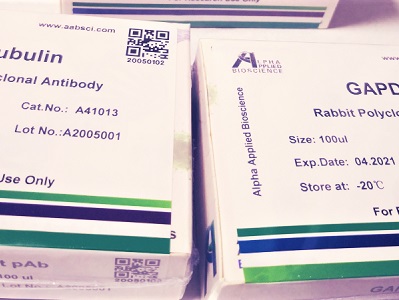

PKC θ (phospho Ser695) rabbit pAb
Cat :A19918
-
Source
Rabbit
-
Applications
WB,IHC,ELISA
-
Reactivity
Human
-
Dilution
WB: 1:500 - 1:2000. IHC: 1:100 - 1:300. ELISA: 1:5000. Not yet tested in other applications.
-
Storage
-20°C/1 year
-
Specificity
Phospho-PKC θ (S695) Polyclonal Antibody detects endogenous levels of PKC θ protein only when phosphorylated at S695.
-
Source/Purification
The antibody was affinity-purified from rabbit antiserum by affinity-chromatography using epitope-specific immunogen.
-
Immunogen
The antiserum was produced against synthesized peptide derived from human PKC thet around the phosphorylation site of Ser695. AA range:657-706
-
Uniprot No
Q04759
-
Alternative names
PRKCQ; PRKCT; Protein kinase C theta type; nPKC-theta
-
Form
Liquid in PBS containing 50% glycerol, 0.5% BSA and 0.02% sodium azide.
-
Clonality
Polyclonal
-
Isotype
IgG
-
Background
protein kinase C theta(PRKCQ) Homo sapiens Protein kinase C (PKC) is a family of serine- and threonine-specific protein kinases that can be activated by calcium and the second messenger diacylglycerol. PKC family members phosphorylate a wide variety of protein targets and are known to be involved in diverse cellular signaling pathways. PKC family members also serve as major receptors for phorbol esters, a class of tumor promoters. Each member of the PKC family has a specific expression profile and is believed to play a distinct role. The protein encoded by this gene is one of the PKC family members. It is a calcium-independent and phospholipid-dependent protein kinase. This kinase is important for T-cell activation. It is required for the activation of the transcription factors NF-kappaB and AP-1, and may link the T cell receptor (TCR) signaling complex to the activation of the transcription factors. [provided by RefSeq, Jul 2008],
-
Other
PRKCQ, Protein kinase C theta type
-
Mol.Wt (Da)
81865
-
Concentration
1 mg/ml
| Product | Reactivity | Applications | Conjugation | Catalog | Images |
|---|
-
 400-836-3211
400-836-3211
-
 support@aabsci.com
support@aabsci.com
-
β-actin rabbit pAb ...... >
-
β-actin rabbit pAb(A284) ...... >
-
Plant-actin rabbit pAb ...... >
-
β-tubulin mouse mAb(M7) ...... >
-
GAPDH mouse mAb(2B8) ...... >
-
GAPDH mouse mAb(PT0325) ...... >
-
Histone H3 rabbit pAb ...... >
-
Histone H3 rabbit pAb ...... >
-
COX IV mouse mAb(6C8) ...... >
-
GFP-Tag mouse mAb(1G6) ...... >
-
HA-Tag mouse mAb(1B10) ...... >
-
mCherry-Tag mouse mAb(6B3) ...... >










 400-836-3211
400-836-3211
